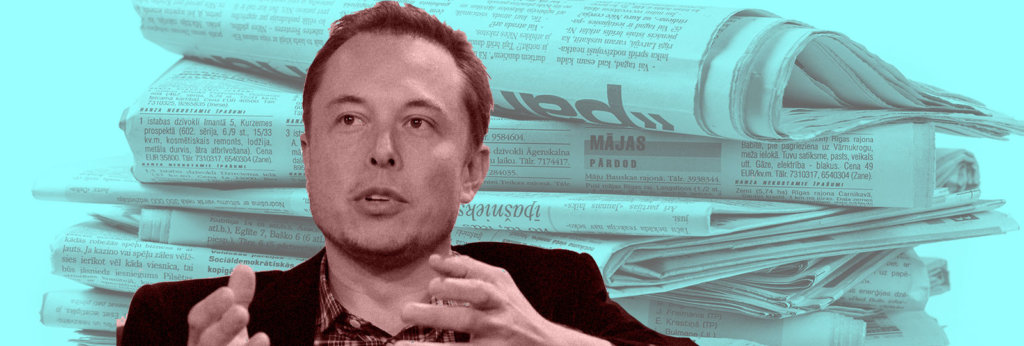The Tesla CEO is calling for a credibility rating system for journalists. What he doesn't know about the media is … a lot.
This article was made possible because of the generous support of DAME members. We urgently need your help to keep publishing. Will you contribute just $5 a month to support our journalism?
Elon Musk threw a Twitter tantrum yesterday, angry at the fact that journalists, after spending the better part of a decade blowing nothing but smoke up his ass, have finally begun to do their jobs and report on Tesla. The fact that the car company has spent billions of dollars but only put 100,000 cars on the road has suddenly sunk in, as has Musk’s non-worker-friendly approaches to labor. Stories of employees being horrifically injured in factories and then quickly hidden away are starting to bubble up through the cracks. The company has now reached the size where not all employees can be silenced, and people are beginning to talk to the media. Musk is particularly pissed off at the investigation on injured Tesla workers, published by Reveal, who’s nonprofit status makes his rant about journalists being beholden to advertisers even more preposterous.
A few years ago, when the Giga factory was first opening up outside Reno, Nevada, I covered it extensively. Tesla hosted a tour of the factory at which it first demanded journalists sign non-disclosure agreements. Amid vocal protests that it is, in fact, journalists’ jobs to disclose things, the company handed journalists back their NDAs at the end of the tour. They needn’t have bothered. The “tour” was kept to sanitized, press-approved parts of the factory, and no one was allowed to ask questions or to quote the tour leaders, despite the fact that they introduced themselves as spokespeople.
A few months later, when I wanted to better understand how exactly Tesla would be “recycling” lithium batteries, which recyclers had repeatedly told me wasn’t being done yet, a spokesperson told me in an email that the company’s batteries contained “no heavy metals or toxic materials.” She explained that the batteries would eventually be returned to the Gigafactory, where they would be turned into new packs. But, according to everything the company has published about its batteries, they contain nickel and cobalt, both heavy metals, as is lithium. Heavy metals can contaminate soil and water, killing plant life and aquatic species and causing potential harm to humans as well.
I am far from the only journalist who has had these experiences covering Tesla, as the responses to Musk this week have shown.
In his tweet storm, Musk has been calling the press “dishonest,” and suggesting that he should create a ratings site for journalists, with scores on their credibility and that of their news organizations. In response, journalists have been sharing all the ways in which Musk has for years felt entitled to control his own image and that of his companies in the press. Sharon Weinberger, executive editor of Foreign Policy, tweeted the following:
I was once invited to visit SpaceX's facility on Kwajalein. Following interviews, I was told @elonmusk had to review all articles prior to publication. I explained journalism doesn't work that way. His current tweets come as no surprise.
— Sharon Weinberger (@weinbergersa) May 24, 2018
Musk has also shared his theory of what is wrong with media today:
Problem is journos are under constant pressure to get max clicks & earn advertising dollars or get fired. Tricky situation, as Tesla doesn’t advertise, but fossil fuel companies & gas/diesel car companies are among world’s biggest advertisers.
— Elon Musk (@elonmusk) May 23, 2018
He’s not wrong that tech has—mostly negatively—impacted the media. But I would argue that tech CEOs like him and their expectation of what media nerds call “media capture” (being able to mostly control what is said about them in the media, in exchange for access to exclusive information or interviews) are a bigger problem than any one journalist’s lust for clicks. Also, it’s not 2005 anymore, Elon, we’ve moved on from clickbait.
Musk is not the only tech CEO who routinely refuses interviews and, when he does grant them, insists on approval for quotes. It’s something they all at least try, it’s just that until the last year, Musk has been particularly effective at getting the press he wants without playing ball. His tantrum is about that. Were he genuinely interested in media he would have invested in it long ago, a la First Look Media founder Pierre Omidyar, who took his tech millions and invested them in investigative journalism.
Do we need media to double-down on reporting and earn the public’s trust? Yes. Does the media need to do a better job of explaining how reporting works and journalism’s responsibility to the general public? Clearly. Should there be some sort of auditing of press credibility? Maybe! I myself have been talking about the need for that for years. Should Elon Musk be in charge of that? Absolutely not.
In fact, the recent stories about Tesla factory conditions, product flaws, and business issues are a sign that journalists are doing a better and more credible job reporting on the company than they ever have. And hey Peter Pan, if you’re reading, here’s how journalism actually works: hours of calls and research and talking to people who don’t want to talk to you and won’t go on the record, and sitting through hour-long meetings with marketing people you know are giving you no info at all, and then finally getting some information on the record, and then writing and rewriting and fact checking and talking to lawyers, and then finally publishing and getting paid maybe $400 for those 40+ hours of work, and getting trolled by a guy who makes millions and thinks you owe him something.
